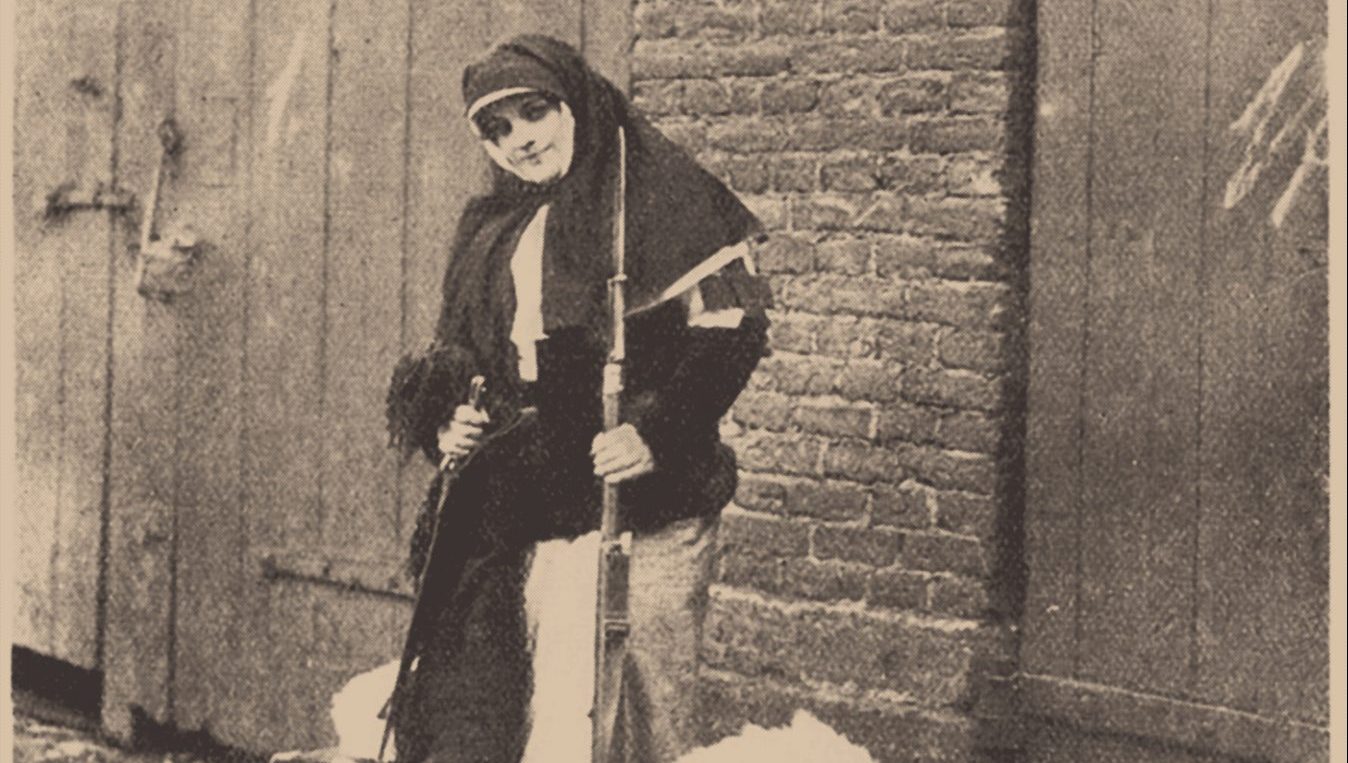“To exist without the everyday, to hang in the air without any familiar footing – with no sure, firm, earthly footing – is something only heroes and madmen can do. A ‘normal person’ needs the trappings of life, life’s earthly flesh – that is, the everyday. Where there’s no laws, no religion, no convention, no settled routine (even if only the routine of a prison or penal camp) then the ordinary person cannot exist.”
As a major celebrity immersed in St Petersburg’s high society before the Russian Revolution, the writer Nadezhda Alexandrovna Lokhvitskaya, known by her pen name Teffi, was an unlikely refugee. But then everyone is an unlikely refugee until they become one. Once everything familiar and reassuring is gone, replaced by a bewildering whirl of constant departures, from cities, towns, railway stations, ports, camps, border crossings, life becomes a rootless odyssey with no named destination. It doesn’t matter who you are. Or were. The perilous trauma of flight strips away your identity, everything you once were, to leave you simply a refugee.
Of all the first-hand accounts of the refugee experience, Teffi’s memoir of
fleeing Bolshevik Russia via Kyiv, Odessa and Constantinople before washing up in Paris, is one of the best. Originally published as a series of columns in the Parisian Russian language periodical Vozrozhdenie between 1928 and 1930, her tale has been available since 2016 in English translation as Memories: From Moscow to the Black Sea. It’s darkly funny, but what makes the book stand out is how she writes as if still in the moment, with a total absence of hindsight or contextual analysis, leaving the bewildering uncertainty of her travels undiluted.
Teffi was born 150 years ago this week on 21 May 1872, an anniversary now thrown into sharper relief by the Russian invasion of Ukraine. With her route out of Ukraine now being followed more than a century later by thousands of the newly displaced, Memories becomes relevant again, yet she
deserves to be read even without such hideous topicality.
In her day Teffi was like a Russian Noël Coward crossed with Dorothy Parker, her gift for social observation combined with a searing wit that never deserted her, even in times of boundless uncertainty.
A committed socialist despite being born into wealthy St Petersburg society Teffi was a late starter as a professional writer, largely because of her marriage at 18 to a Polish lawyer. Life on a remote estate in what’s now Belarus proved stupefyingly dull so at the dawn of the 20th century she left her husband and their three children behind and returned to St Petersburg to write.
Around the time of the 1905 Revolution Teffi began writing for the new
pro-Bolshevik newspaper Novaya Zhizn (New Life), honing the sharp satires and sketches for which she would become known. Her work for the paper also allowed her to examine Lenin at close quarters and she was far from impressed.
“Slightly balding, rather short, untidily dressed, he could have been a minor official from some remote local council,” she wrote. “There was nothing
about him to suggest a future dictator.”
She soon realised Lenin intended to turn the free-spirited Novaya Zhizn into the earnest official organ of the Bolsheviks, but it was Lenin’s philistinism that led to Teffi departing the newspaper. “We don’t need theatre, nor do we need music,” she records him as saying. “We don’t need articles about art or culture of any sort.”

For a woman besotted by literature for as long as she could remember – as a
13-year-old she had found her way to Tolstoy’s door in order to beg him not to kill off Prince Bolkonsky in his War and Peace serialisation but lost her nerve and asked for his autograph instead – this was an attitude impossible to countenance.
Her release from Novaya Zhizn prompted an extraordinary creative flowering over the dozen years or so before the 1917 Revolution, producing
plays, books, short stories and poetry that turned Teffi into one of late Imperial Russia’s biggest celebrities.
She adopted her pseudonym, adapted from a favourite childhood clown called Steffi, in 1907, largely because she knew how hard it was for a woman to succeed in the male-dominated world of Russian literature but possibly also to avoid confusion with her older sister Mirra Lokhvitskaya, a a poet of great renown.
So famous did Teffi become there was even a range of merchandise, from branded perfume to confectionery. One day a friend gave her a box of chocolates, each wrapped in paper bearing her name and face. Left alone with them, Teffi ate the lot in one sitting.
“I had gorged on fame until I’d made myself ill,” she wrote. “That’s when I
understood its flip side.”
Despite her well-known far-left views, Teffi boasted fans in high places. In 1913 a literary anthology was planned to mark 300 years of the Romanov dynasty and when Tsar Nicholas II was consulted on which contemporary writers to include, he barked, “Teffi. She alone. Anyone else is unnecessary”.
Although supportive initially, by the Revolution of October 1917 Teffi had had enough of the Bolsheviks. The following spring she left the chaos and violence of her renamed home city Petrograd for Moscow, then at the end of that summer, when she discovered actors had been persecuted for performing her works, decided to head south on a reading tour until things had calmed down. The last thing she suspected as she watched the countryside pass her train window was that it was the last she’d ever see of Russia.
She remained for a while in Kyiv, then under German control, along with a large number of displaced intellectuals who set about recreating their old Moscow and St Petersburg lives. On the surface things appeared normal, “but [Kyiv] seemed more like a station waiting room just before the last whistle”.
With Spanish flu sweeping through the refugee community – Teffi fell ill
herself but recovered – and with the Germans’ defeat in the war opening the
way for a Ukrainian socialist army to descend on Kyiv, she joined the crowds
of refugees at the city’s railway station to make for the Black Sea port of Odessa.
As she squeezed into a crowded carriage waiting to depart the frightened
city, rumours spread that a train had just arrived badly damaged by Bolshevik artillery with many casualties on board.
“Dead! Wounded!” she writes. “How accustomed we now were to these words. No one felt any particular alarm or distress. No one said, ‘How awful!’ or “What a tragedy!’ Our way of life had changed, and in accord with this new way of life people thought ‘just bandage the wounded and remove the dead’.”
At Odessa, she boarded a ship effectively crewed by the refugees after the vessel was abandoned by its crew. Everyone pitched in, Teffi swabbing the
decks enthusiastically until informed, “your scrubbing is abominable”. She
writes of meeting a stoker on board blackened from head to toe with soot,
once a young man of privilege who had attended soirées in her St Petersburg
home. His whole family had been killed, he said, and he was planning to join
whoever was fighting the Bolsheviks.
One of her most poignant passages describes the gradual deterioration of the once-wealthy women refugees’ sealskin coats. Although they’d departed in the summer the women sweltered in their coats in preparation for the ordeal ahead. Teffi describes how in Kyiv and Odessa the garments were “still looking new, their fur all smooth and glossy”. A few weeks later they were “thin around the edges and with bald patches down the sides and on the elbows”. At Constantinople the coats had “grubby collars and cuffs folded back in shame”, while by the time they reached Paris in 1920, “the fur had worn away completely, right down to the shiny black leather”. Four years later, “these coats had disappeared. All that remained were odds and ends, torn scraps of memories, bits of trimming sewn onto the cuffs, collars and hems of ordinary woollen coats”.
Teffi eventually settled in Paris where she remained until her death in 1952 but, like every refugee, never recovered from the wrench of displacement. Paris was not home and never would be. She was privileged enough to regain much of her previous identity and status but never forgot how she and everyone wrenched from all they knew to throw themselves on the kindness of others elsewhere were anonymised and traumatised by the refugee experience. “People themselves were whirled this way and that way, left and right, over the mountains or into the sea,” she wrote. “Soulless and mindless, with the cruelty of an elemental force, the whirlwind determined our fates.”
Memories: From Moscow to the Black Sea by Teffi, trans. Robert Chandler, Elizabeth Chandler, Anne Marie Jackson and Irina Steinberg is published by Pushkin Press, price £10.99




